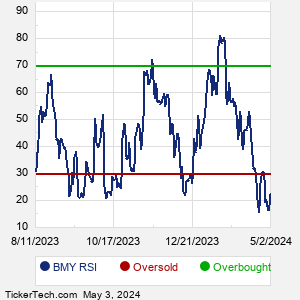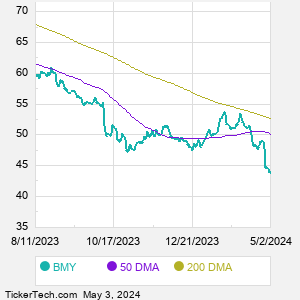Bristol-Myers Squibb is engaged in the discovery, development, licensing, manufacturing, marketing, distribution and sale of biopharmaceutical products on a global basis. Co.'s pharmaceutical products include chemically-synthesized or small molecule drugs, products produced from biological processes, called biologics and chimeric antigen receptor T-cell therapies. Co.'s primary product includes Eliquis® - Eliquis (apixaban), which is an oral Factor Xa inhibitor indicated for the reduction in risk of stroke/systemic embolism in non-valvular atrial fibrillation and for the treatment of DVT/PE and reduction in risk of recurrence following initial therapy.
When researching a stock like Bristol-Myers Squibb, many investors are the most familiar with Fundamental Analysis — looking at a company's balance sheet, earnings, revenues, and what's happening in that company's underlying business. Investors who use Fundamental Analysis to identify good stocks to buy or sell can also benefit from BMY Technical Analysis to help find a good entry or exit point. Technical Analysis is blind to the fundamentals and looks only at the trading data for BMY stock — the real life supply and demand for the stock over time — and examines that data in different ways. One of these ways is called the Relative Strength Index, or RSI. This popular indicator, originally developed in the 1970's by J. Welles Wilder, looks at a 14-day moving average of a stock's gains on its up days, versus its losses on its down days. The resulting BMY RSI is a value that measures momentum, oscillating between "oversold" and "overbought" on a scale of zero to 100. A reading below 30 is viewed to be oversold, which a bullish investor could look to as a sign that the selling is in the process of exhausting itself, and look for entry point opportunities. A reading above 70 is viewed to be overbought, which could indicate that a rally in progress is starting to get crowded with buyers. If the rally has been a long one, that could be a sign that a pullback is overdue. |



